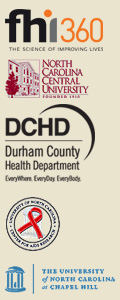
| Project News and Events | |
| Other Events and Activities | |
| Resources | |
| Get Involved | |
| Contact Us | |

|
|
Frequently Asked Questions (FAQs)
What is the LinCS 2 Durham HIV Prevention project?
The LinCS 2 Durham project unites community members with scientists so together we can decide what research needs to be done to prevent HIV in the Black community. We want to understand concerns people have about HIV, prevention, and medical research, and then work together to address those concerns.
The LinCS 2 Durham project does not involve any medical or experimental research. Instead, this project does provide communities and scientists the opportunity to talk, listen, and learn from each other in order to help direct the course of future HIV-prevention.
This is a five-year research project undertaken by FHI, North Carolina Central University (NCCU), the Durham County Health Department (DCHD), the University of North Carolina at Chapel Hill Center for AIDS Research (CFAR), and the University of North Carolina at Chapel Hill (UNC). The National Institute of Nursing Research, part of the National Institutes of Health, is providing funding for this project.
What is the LinCS 2 Durham Collaborative Council?
The Collaborative Council consists of a wide array of individuals who care about the impact of HIV in Durham. Members are people who live and work here, people who provide HIV-related services, local scientists working on HIV, people who volunteer for HIV-related research studies, and the community advocates and policy-makers who are working for positive change for HIV prevention and services. Together we want to identify and pursue the best HIV-prevention research opportunities for Durham’s Black community.
What do Collaborative Council members do?
The LinCS 2 Durham Collaborative Council members discuss issues related to HIV prevention in Durham's Black communities, participate in community events, and provide feedback to the project on its community survey with young Black adults in Durham. The group currently meets once a month for approximately two hours.
Why is HIV-prevention research important?
HIV is a serious health crisis for Black Americans, and must be faced head-on. Forty-five percent of people newly diagnosed with HIV in 2006 were Black. In the South, Black Americans accounted for 61percent of new HIV diagnoses in 2007. In 2009, Blacks represented 65 percent of all new HIV cases (1,118 of 1,710) in North Carolina. Of the 94 people newly infected in Durham in 2007, 67 were Black. Durham County has the fourth-highest HIV infection rate in North Carolina, with 86 new infections reported in 2009. Black Americans face a huge disease burden from HIV, and research should be directed towards developing prevention strategies that work for communities heavily affected by HIV.
How can I get involved?
The best way to get involved is to attend one of our Collaborative Council meetings. Please see our Project News and Events page for details on upcoming meetings, email us, or call Randy Rogers, our Collaborative Council facilitator, at (919) 560-7675. As LinCS 2 Durham progresses, there will be many opportunities to participate in discussion groups, community events, and community surveys to add your voice to the conversation!
Where are other places I can find information about the LinCS 2 Durham project?
In addition to consulting our website, you can locate information about the project on our Facebook page. You can also follow us on Twitter and send us an email.
How can I learn about events that LinCS 2 Durham is sponsoring?
You can visit our Events page, our Facebook page, our Twitter page, or send us an email.
| Contact the Webmaster | Feedback Form | Subscribe to Our E-newsletter | Terms of Use | Home |